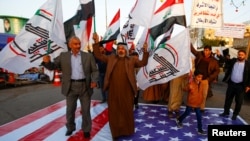Readers visiting websites for Al-Etejah TV, a satellite television channel affiliated with Iraq’s Kataib Hezbollah (KH), find an unusual English-language message instead of the group’s propaganda material.
“This website has been seized,” reads the bold message placed on a red background atop two logos for the U.S. Department of Commerce.
The U.S. seizure of two domain names, “Aletejahtv.com” and “Aletejahtv.org,” last Wednesday represented the latest move by Washington against the radical Iran proxy group in cyberspace.
In 2009, the U.S. designated KH a terror group “for threatening the peace and stability of Iraq” and attacking the U.S. interests in the country.
“Once again we see designated foreign terrorist organizations turning to the internet to push their message and recruit followers for their violent causes,” said John Demers, assistant attorney general for national security, in a statement published by the Department of Justice Wednesday.
“We will continue to fight terror recruitment and propaganda efforts in the digital world, as we do elsewhere,” he added.
Some observers say it remains uncertain how effective the latest U.S. move against KH can be, given the group’s ability to regenerate propaganda content through other online platforms.
VOA confirmed that the station’s programing was still available for Iraqis to access on TV and social media websites such as YouTube on Friday.
“Removing a domain name for an Iran propaganda outlet or a militia propaganda outlet is a weak reaction,” said Bilal Wahab, an Iraq expert at the Washington Institute for Near East Policy, adding that KH and its leaders continued to enjoy access to a large audience on social media and local television channels in Iraq.
Responding to requests from the U.S. government, social media giants such as Twitter and Facebook have regularly removed terror and extremist content online.
After an earlier temporary restriction, Twitter in June permanently suspended an account for Qais Khazali, a pro-Iran Iraqi militia leader, that had several hundred thousand followers.
But some KH leaders including its spokesman, Abu Ali al-Askari, continue to have active Twitter accounts.
“This is a disruptive cyber operation that will cause them a headache for sure,” said Dilshad Othman, a Washington-based cyber security expert, adding that KH could possibly register its website with a domain such as Iran-owned dot IR (.ir) to remain outside U.S. legal control.
It is not the first time that the U.S. government targeted websites belonging to pro-Iran militias. When it seized KH’s main website last year, the group sought to find alternative avenues.
“Rather than abandoning the internet, KH has simply moved into other areas of the internet that are less well policed than dot com websites,” Evan F. Kohlmann, a New York based counterterrorism expert who formerly worked for the FBI, told VOA.
He added that the group continues to enjoy “a flourishing presence” on encrypted platforms such as Telegram. The cloud-based chat service has also for years been a major home for the Islamic State and other banned groups.
KH’s founding leader Abu Mahdi al-Muhandis was killed in January in a U.S drone strike that targeted and killed Iran’s powerful military general Qassem Soleimani.
Mehdi Jedinia contributed to this story from Washington




